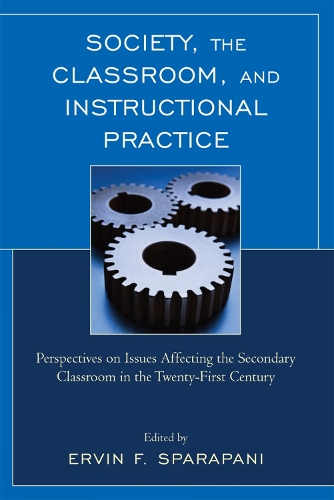
Society, the Classroom, and Instructional Practice: Perspectives on Issues Affecting the Secondary Classroom in the 21st Century
(Paperback)
Publishing Details
Society, the Classroom, and Instructional Practice: Perspectives on Issues Affecting the Secondary Classroom in the 21st Century
By (Author) Ervin F. Sparapani
Contributions by Suzanne M. Booth
Contributions by LaCreta M. Clark
Contributions by Kelli M. Clemmensen
Contributions by Jonathon A. Gould
Contributions by Natalie A. Haupt
Contributions by Patricia A. Salemi
Contributions by Renay M. Scott
Contributions by Byung-In Seo
Contributions by Deborah L. Smith
Bloomsbury Publishing PLC
Rowman & Littlefield Education
16th July 2009
United States
Classifications
General
Non Fiction
Secondary schools
373.72
Physical Properties
Paperback
238
Width 155mm, Height 231mm, Spine 17mm
361g
Description
Society, the Classroom, and Instructional Practice has been developed to help middle and high school teachers speak to the difficult 21st century issues in a rational, thoughtful manner.
Dr. Sparapani has collected a set of experts who address societal issues as far ranging as sexual minorities, eating disorders, and urban education. He then has contributors to the book offer insights into integrating developmental and sociological theories into secondary education. In the third and final section, Dr. Sparapani has formed a group of experts to help in-service and pre-service teachers understand how they can address relevant real-world issues in their classrooms while teaching the school's established curriculum.
In one text, Dr. Sparapani examines broad theoretical pedagogy, then narrows it to real-world application for teachers. As an edited volume, Dr. Sparapani has utilized the best experts in the field, giving the reader a variety of relevant and validated voices for a solid foundation in education and the current issues facing the profession today.
Reviews
Teaching is a complex endeavor. The Society, the Classroom, and Instructional Practices provides a comprehensive collection of ideas and approaches to inform teaching and learning for the 21st century. The authors offer rich discussion of pertinent issues that impact schools nd classrooms. The work offers practical information for professionals that will assist them in understanding the multifaceted nature of schooling and how issues potentially affect the learning environment. This book is a must for teachers and education professionals who want to be successful practitioners. -- David K. Pugalee, University of North Carolina, Charlotte
Twentieth century secondary teachers have been primarily masters of the content they teach. But the issues of the 21st century require teachers to expand their domain of expertise. When students have easy access to content experts outside the school, the teachers role and instructional practices must change. This work is essential to preparing secondary teachers who understand their larger roles in instruction. -- Catherine B. Smith, manager, Professional Preparation and Development Unit, Michigan Deptartment of Education
This text is outstanding in linking the issues and basis of society and its commitment, or lack thereof, to schools, schooling, and the decisions made by the classroom practitioner and how they might affect the outcome of classroom instruction. This text connects the lives and educational needs of the secondary students/persons with the society that they are part of, while addressing the complexity of the relationship of instruction and the learner in the milieu of the society as a whole. Further, it,cogently, discusses issuessuch as gender, social class, the power structure, race/ethnicity, and inequality of educational opportunityin the culture of the United States of America. The text focuses on the results of current research as the basis for decision-making about instructional methodology and strategies.. -- Francis D. Silvernail, retired, associate professor of education, Department of Education, College of Staten Island of the City University of New York (CUNY)
In this book, an inspired cadre of scholars addresses critical issues in education that are at the center of modern schooling. Both current and future secondary-level teachers will do well to heed these authors as they struggle to make sense of an ever increasingly complex classroom environment. -- Daniel B. Coupland, assistant professor of education, Hillsdale College
This text is outstanding in linking the issues and basis of society and its commitment, or lack thereof, to schools, schooling, and the decisions made by the classroom practitioner and how they might affect the outcome of classroom instruction.
This text connects the lives and educational needs of the secondary students/persons with the society that they are part of, while addressing the complexity of the relationship of instruction and the learner in the milieu of the society as a whole. Further, it, cogently, discusses issuessuch as gender, social class, the power structure, race/ethnicity, and inequality of educational opportunityin the culture of the United States of America. The text focuses on the results of current research as the basis for decision-making about instructional methodology and strategies.
Author Bio
Ervin F. Sparapani is a professor at Saginaw Valley State University in the Department of Middle School and Secondary Teacher Education, having taught there for twenty-four years. He earned his Ph.D. at the University of Michigan, Ann Arbor in 1983.
